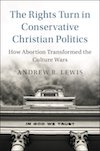Historically, the Christian Right has not been recognized for its celebration of liberal values. On the contrary, any reference to organizations such as the Moral Majority and Christian Coalition is likely to conjure decidedly illiberal associations. These advocacy groups were famous for their boisterous condemnation of mainstream society and their attempts to legislate a rigid set of conservative moral codes. Among their policy goals, anti-abortion activism was pursued with the greatest zeal. But a recent book by political scientist Andrew R. Lewis suggests that this single-minded religious movement may have yielded some unintended political effects.

The Rights Turn in Conservative Christian Politics: How Abortion Transformed the Culture Wars
Andrew R. Lewis
Cambridge U Press
Oct 19, 2017
Your book argues that anti-abortion activism has prompted the Christian Right to embrace liberal discourse. How so?
The primary argument is that the politics of abortion have taught conservative Christians about the value of public arguments grounded in the language of rights, as rights are one of the most accessible forms of American political discourse. This is particularly true as American culture has become more secular and less apt to embrace calls for public morality.
Going back to the early days of the pro-life movement in the 1960s, there was a strong liberal, human rights element to anti-abortion activists, seeking to defend the right-to-life of the unborn. Much of this came from Catholics. As evangelicals and the Christian Right joined the cause in the late 1970s and early 1980s, there was often more rhetorical focus on the immorality of abortion than the rights of the unborn. This reflected the politics of the “Moral Majority.”
A rights-based stream within the pro-life movement persisted, however, and by the late 1980s and early 1990s, the right-to-life rhetoric triumphed for both the elite activists and the rank-and-file. Importantly, this right-to-life-based framework has allowed for opposition to abortion to compete with the liberal right-to-privacy based argument, serving as a quality public counter-argument. Even more, as conservative Christians have increasingly become a cultural minority in the past two decades, they have begun embracing rights-based rhetoric first learned and used in the pro-life movement in a whole host of other areas of public life, specifically free speech and religious liberty politics.
The minority angle is interesting since many scholars have traced the founding of the Christian Right back to desegregation, rather than abortion. Does racial politics factor into your argument?
My book is not specifically about the causes of the Christian Right or the shifting of partisan alignments in the South in the latter half of the twentieth century, though I do think my work has some implications for these arguments.
I point readers to those debates, particularly about the role of race versus abortion in the launching of the Christian Right. But I am particularly interested in how conservative Christian politics have been transformed after partisan realignment has occurred—after the conservative Christians have been largely integrated into Republican politics. It is the later period, from the mid-1990s to the present, when the politics of rights have emerged as a dominant force in Christian Right politics. Some of the most thorough quantitative analysis suggests that racial politics were more responsible for partisan change prior to 1990, but after 1990 abortion and other cultural issues played an important role. And so I think I can say with confidence that abortion politics were particularly important in this period.
That said, I do think my book provides a challenge to the historical narrative that minimizes the importance of the politics of abortion in evangelical and Christian Right politics. My book shows how central this issue has been to a host of conservative Christian issues over time, both in elite and mass politics. Abortion is central to conservative Christian politics because it is what political scientists call an “easy issue”—an issue on which people may develop strong, stable opinions. Therefore, it can be used to expand the scope of political conflict into new arenas, and over the past few decades it has been used to teach conservative Christians about the value of rights.
How has the shift toward liberal argument impacted Christian Right positioning with regard to church-state separation?
The biggest change over the past half-century has been the shift toward an almost-singular focus on the free exercise of religion and the right to religious liberty. In a chapter on this in my book, I give most of my attention to the Southern Baptist Convention (SBC).
For much of the twentieth century, the SBC was a strong advocate for church-state separation, defending the First Amendment’s No-Establishment Clause in court and in politics. Now the SBC has largely shifted to defend the Free Exercise Clause exclusively, seeing no real threats to the Establishment Clause. This shift in advocacy corresponds with a major political change within the SBC, but it also corresponds with a change in approach to abortion, which seemed to drive the justification away from the separation position.
Evangelicals became friendlier with Catholics during their shared labor on the abortion issue. Prior to this, Catholics had previously been a primary concern of those promoting church-state separation. Also, if a primary goal is to promote anti-abortion advocacy, which is often couched in religious terms, then religious liberty and not non-establishment must become a priority. And now with the declining status of Christianity in America, religious liberty is continually emphasized. Because of this, the language of rights has been used much more often by conservative Christians, both in public and legal domains.
How has the shift affected Christian Right positions on other issues—such as their opposition to universal health care and support for capital punishment?
In general, until the past decade evangelicals have held similar views to the general public on government-provided health care, but the politics of abortion have played important roles in thwarting major efforts on national health reform. Once Roe v. Wade established a constitutional right to obtain an abortion, abortion politics have been linked with health care politics. This has played out in the variants of the Hyde Amendment, the opposition to the Clinton Health Security Act of 1993, and the Affordable Care Act of 2010. Evangelicals, in particular, have tempered the Left’s right-to-health care with a primary emphasis on “protecting the rights of the unborn.” This can be seen in the advocacy messages and strategies.
Capital punishment is a nuanced story, and one that is in flux. There has been much emphasis on the Catholic “seamless garment” approach, seeking to maintain a “consistent life ethic” to abortion and capital punishment. Pope Francis has recently pushed the Church even more strongly in this directly.
Most evangelicals are supporters of capital punishment, and many evangelical theologians and churches justify capital punishment with a pro-life ethic. The argument is that life is of such a high value that the taking of innocent life demands a capital punishment. So Catholics and evangelicals both use right-to-life justifications, but the Catholics focus on the offenders and the evangelicals focus on the victims.
In a series of survey experiments, these pro-life justifications for the death penalty are seen as more persuasive than pro-life justifications for abolishing the death penalty. That said, evangelical support for capital punishment is declining from its highs in recent years. This is likely due to the public awareness of innocent people being convicted of murder, though it has been welcomed by some calls for less punitive rhetoric and policies within evangelicalism.
Maybe the most recent deployment of liberal argument from the right concerns same-sex marriage. How did they settle on a religious freedom frame?
Even prior to Obergefell v. Hodges, religious freedom arguments were being advanced by conservative Christians who disapproved of same-sex marriage. For example, several state-level Religious Freedom Restoration Acts (RFRA) were put into motion in 2014 and early 2015 in part to try and protect religious objectors.
Immediately after the Obergefell decision, the senior counsel of Alliance Defending Freedom stood on the steps of the Supreme Court and argued for the courts and politics to protect the rights of those who disagree with the decision. Legally, religious freedom is a natural fit, particularly in states with a RFRA, because states need to prove a “compelling state interest” and use the “least restrictive means” to “substantially burden” the religious exercise of individuals—and perhaps businesses. These vary by state, but politically and culturally the shift to religious freedom signaled that these conservative Christian groups were not going to fight the legalization of same-sex marriage by seeking to overturn the decision. Rather than try and overturn Obergefell, as they have been doing with Roe, they consider this a lost cause, retreating instead to a stronger, minority rights position.
You close the book with the hopeful suggestion that this new familiarity with rights discourse will make the Christian Right more attentive to the rights of others and more open to deliberation in a pluralist society. How might that work?
I think it is already working. Over the past 40 years, survey data suggests that evangelicals have become much more supportive of free speech for marginalized groups. Where evangelicals used to be well below the general public on support for free speech, they have largely caught up.
The legal advocacy of conservative Christian advocacy groups matches this trend, as it champions pretty broad free speech rights, not just for evangelicals but also for non-allies. Survey data additionally suggest that evangelicals have become more accepting of gays and lesbians in public life over the past several decades, and the public rhetoric toward these groups, particularly their public participation in society, has become less hostile.
In a survey experiment I conducted with my colleagues, when we primed evangelicals to think about their own rights being in jeopardy, they responded by being more tolerant of groups they liked the least. All in all, the trend is toward evangelicals trying to find their place in the culture, rather than seeking to dominate the culture in the ways that are familiar to those who lived through the Moral Majority and its heirs.
Of course there will still be disagreement among those who feel that conservative Christians’ rights are infringing on their own, as well as episodes where the old ways resurface, but the trajectory of conservative Christianity seems to be toward rights and pluralism. This change is monumental, and the pro-life movement and the changing culture have had big influences on it.





